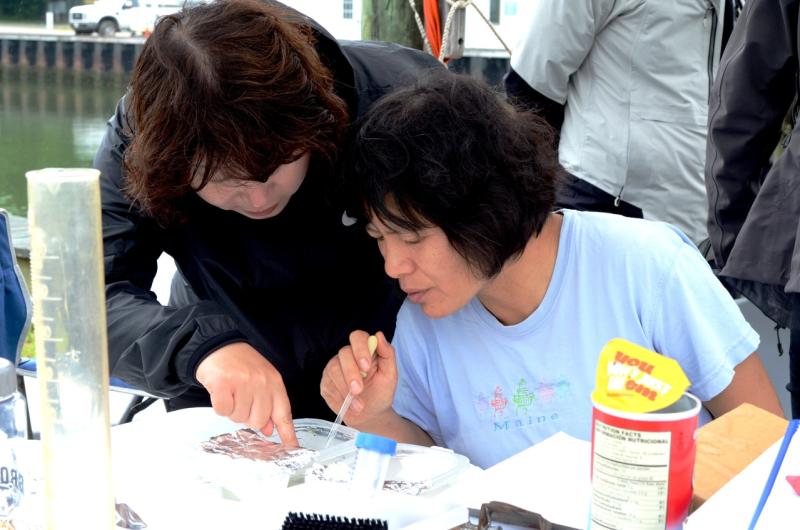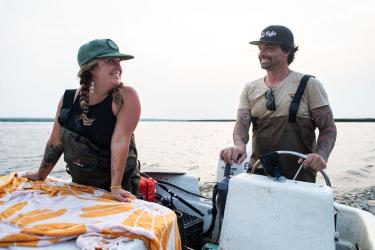March is Women’s History Month. We’ve asked five of our women scientists to share a little about their science journey, what hurdles or obstacles they’ve experienced during their journey, how they overcame them, and what advice they might have for the next generation of women scientists. They're candid, honest and full of sage advice. Tune in each week in March as we share their incredible stories.
Judy is a research ecologist at our Milford Lab in Connecticut and works in our Aquaculture Sustainability Branch. She conducts phytoplankton and coastal environmental research related to fisheries, particularly aquaculture. To learn more about Judy’s research and professional history, please visit Judy's staff page.
1. Can you tell us about your science journey, your career in science?
I grew up in Ningbo, China, a coastal city close to the most productive fisheries in China called Zhoushan Islands. The name for these islands translates to “mountain of ships.” Various kinds of seafood like fish, shellfish, squids, and even jellyfish were caught around these islands and were the main protein source for my family. Some of my happiest childhood memories took place here. I remember vividly going to the beach after school to catch crabs, snails, and other beach creatures at low tide. I also remember waiting to buy fresh seafood just unloaded from the fishing boats. Water not only provided food but also alternative transportation, like when we took an overnight boat trip to Shanghai (the biggest city in China). Looking back on it now, I realize that my childhood experiences played a major role in what I do today. Although I have settled in a place on the other side of the earth, I am still connected to water.
There was no magic or dramatic single moment for deciding to be an ecologist. It seems that I have been on that path all my life. And like others, my path was not a straight one. My undergraduate college major was botany, and I selected an algae-related topic for my senior project. My master’s thesis focused on marine diatom ecology. I earned my PhD in Biological Oceanography at the University of Rhode Island’s Graduate School of Oceanography, studying the bioluminescence of dinoflagellates.
2. Could you share an example of a hurdle or obstacle you experienced during your science journey and how did you overcome it?
As a scientist, conducting research does not mean simply looking for answers to satisfy your curiosity. There are other factors to consider, including resources such as technical assistance, equipment, and funding. Additionally, we government scientists need to align our research and research questions with the mission and goals of our agency. I think this is most likely also true for scientists in non-profit organizations. When things are not quite going the way you would like, not aligning, hang in there! Perfect your skills, re-adjust your focus, adopt new skills and technologies, and look for the next opportunity.
Like many women, juggling family and career is always a challenge. I am fortunate to have a very supportive family. I also appreciate where I work. My supervisor and colleagues (both women and men) are so supportive. They’re very inclusive and value individuals of all genders. I always appreciate the group of hard-working women scientists at the Milford lab who are dedicated, productive, and fun. They are role models and inspirations to me.
3. What has been your biggest career and/or personal achievement?
I am very proud of the aquaculture and environmental research I conduct with my capable, talented, and fun colleagues at the Milford Laboratory. Our research contributes to the understanding of shellfish aquaculture in the context of the environment and it helps promote healthy and sustainable fisheries and their ecosystems. I’m also proud that I’m able to apply my knowledge and skills from my education and work experiences to aquaculture and fisheries research, whether it be related to shellfish, seaweed, and even salmon restoration.
Personally, I am very proud of my family, a husband and three kind, responsible, and passionate children. Two of my children have been involved in a high school science research program. I apply science in daily life without noticing it and my children are there to let me know how much fun they have with me when that happens. For example, one day they told me they understood why we put heavy things toward the front of the trunk of the car, and why we put the lighter things towards the back of the trunk. That happened when they learned about inertia in physics class. At home I cook and bake with my family. Cooking and baking are filled with opportunities to talk about science! We’d discuss things like why pancake batter shouldn’t be stirred too much in order to make fluffy pancakes (answer: less stirring prevents carbon dioxide gas from escaping). We also talked about the chemical process that makes muffins fluffy (adding baking soda to liquid ingredients creates carbon dioxide) and how it’s different than the microbiological process (yeast enzymes turn flour into simple sugars, yeast metabolizes sugars, releases carbon dioxide and ethyl alcohol) that makes bread rise while we’re baking.
4. What advice would you give young women about a career in science?
Allow yourself to explore and experience before you decide a career in science. I would like to let young women (and men) know that there are challenges in finding jobs in science, particularly in the marine and environmental related fields. There are more PhDs produced and being produced in these fields than the “traditional” job market can support. By traditional I mean tenure-track professorships at universities and research positions at non-academic institutions. It is important to keep an open mind for other non-traditional science jobs, such as those in the industries, environmental management agencies, and non-governmental organizations.
In short, be focused and flexible when pursuing a career in science. Have a long-term goal but allow for short-term detours. Value all the experiences you’ve had, even when it’s not seemingly related to your direct path. Finding a mentor and a team to work with is sometimes more important than other things.

